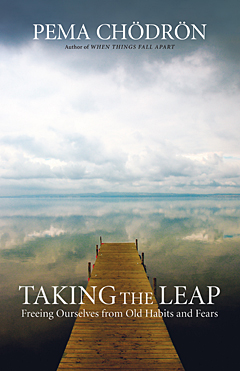Books |
Pema Chodron: Taking the Leap: Freeing Ourselves from Old Habits and Fears
By
Published: Dec 19, 2017
Category:
Spirituality
My mother is 100. She lives in California. I call her almost every day.
The other day I screamed at her and hung up. Awful, I know. I make a joke of it. “I have a new definition of ‘elder abuse,'” I say. “It’s a 100-year-old person abusing a 70-year-old person.”
Clever, but not the point. The point is: Why, after all these decades, does she push my buttons? Why haven’t I learned to sidestep conflict?
You’re nodding. This happens in your life. Someone says something, does something. Somebody else reacts.
In the space between those sentences and the reaction — a matter of seconds, if that — lies disaster. Or opportunity.
We are — and don’t we ever know it — stimulus/response loops. Creatures of habit. Slaves to habit, actually, even when we can see how self-defeating those habits can be.
Get upset, eat or drink. Get upset, lash out. And so on.
Pema Chodron — you know her from When Things Fall Apart and The Wisdom of No Escape — is not a writer who discourses on Buddhist texts. She’s a next-door neighbor Buddhist. Reading her is like hanging out the wash or raking leaves with a friend — she tells a couple of stories, drops a shrewd line or two, and goes home. Ten minutes later, your head explodes. [To buy the paperback of “Taking the Leap” from Amazon, click here. For the Kindle edition, click here.]
Her single topic here is shenpa. It means “attachment” — but that’s too formal for her. Try “what it feels like to get hooked."
Somebody says a harsh word and something in you tightens: instantly you’re hooked. That tightness quickly spirals into blaming the person or denigrating yourself. The chain reaction of speaking or acting or obsessing happens fast. Maybe if you have strong addictions, you go right for your addiction to cover over the uncomfortable feelings.
The question thus becomes: When something triggers in you, how do you disarm it?
To her great credit, Pema Chodron does not soft-sell the difficulty:
There was a story that was widely circulated a few days after the attacks of September 11, 2001, that illustrates our dilemma. A Native American grandfather was speaking to his grandson about violence and cruelty in the world and how it comes about. He said it was as if two wolves were fighting in his heart. One wolf was vengeful and angry, and the other wolf was understanding and kind. The young man asked his grandfather which wolf would win the fight in his heart. And the grandfather answered, “The one that wins will be the one I choose to feed.”
Then she gets personal, telling a story about a woman who had wronged her. What did she do? Pema Chodron — exalted Buddhist teacher — left a blistering message on that woman ‘s answering machine. Her daughter watched her do it. "Mom, I have never seen you lose it like that,” she told Chodron. (That’s some daughter.)
What we need to do, Chodron says, is make the leap:
Now is the time to develop trust in our basic goodness and the basic goodness of our sisters and brothers on this earth; a time to develop confidence in our ability to drop our old ways of staying stuck and to choose wisely. We could do that right here and right now.
And though it sounds so easy — “Relate moment by moment to what is happening on the spot” — that it doesn’t seem this message could fill even 128 pages. But it’s damned hard stuff.
A serviceman in Iraq told this story: He said it happened on a pretty typical day, when he had once again witnessed his fellow soldiers, people he loved, being blown up. And once again he and all the others in his division wanted revenge. When they located some Iraqi men who were possibly responsible for killing their friends, they went into the men’s darkened house, and because of their anger and being in such a claustrophobic situation where violence was the atmosphere they breathed, the soldiers acted out their frustration by beating up the men.
Then when they put a flashlight on their captives’ faces, they saw that one of them was only a young boy who had Down’s syndrome.
This American serviceman had a son with Down’s syndrome.
No need to tell you the rest of that story, is there?
One more passage from this deceptively powerful book:
All of us know how healing it is to be kind, how transformative it is to love, what a relief it is to have old grudges drop away. With just a slight shift in perspective, we can realize that people strike out and say mean things for the same reasons we do. With a sense of humor we can see that our sisters and brothers, our partners, our children, our coworkers are driving us crazy the same way we drive other people crazy.< Gotta love her.


